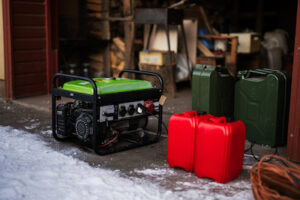How to Store Gasoline at Home Safely
According to the National Fire Protection Association, an estimated 160,000 residential fires are caused by cooking, heating, and electrical equipment each year, resulting in approximately 2,600 deaths, 12,000 injuries, and $7.2 billion in property damage. That’s why it is so important to practice proper gasoline storage to ensure safety and prevent accidents. So, whether you use gasoline for your lawnmower, generator, or other equipment, it’s essential to store it correctly to minimize the risk of fire or explosions. In this article, we will explore the best practices for gasoline storage at home, providing you with expert advice and guidelines to ensure the safe handling of this volatile liquid.
Fueling Up Safely – Things to Know About Gasoline Storage
Observe Common-Sense Safety Precautions
When it comes to handling gasoline safely, there are some essential safety precautions to keep in mind.
Firstly, it is important to wear protective gear, such as gloves and goggles, when handling gasoline. This will help protect you from spills, splashes, and potential skin irritations.
Secondly, always work in a well-ventilated area to avoid inhaling harmful fumes.
Finally, if you are not trained to use fuel systems safely, do not attempt to operate or refuel without an experienced guide.
Additionally, look for fuel specifications on tools that operate with fuel to ensure you know how to refuel them properly. For example, standby generator installer includes precautions and safety guidelines with its generator products to help keep home users safe.

Understand the Risks
Improper fuel handling and storage can lead to a range of accidents and injuries. Some of the most common accidents related to fuel handling and storage include:
– Fires and Explosions
Gasoline is highly flammable and can ignite if it comes into contact with a spark or open flame.
– Carbon Monoxide Poisoning
Carbon monoxide is a colorless, odorless gas that can be fatal if inhaled in high concentrations. This gas can build up quickly if fuel-powered equipment is used in a poorly ventilated area.
– Burns and Skin Irritations
Spills and splashes of gasoline can cause burns and skin irritations, especially if protective gear is not worn.
Follow Industry Guidelines When Storing at Home
Proper fuel storage and handling are crucial for ensuring the safety and security of your home. It’s important to maintain heating systems and equipment, such as tanks and valves, and regularly have regular inspections by qualified professionals.
Follow guidelines from the National Fire Protection Association for safe delivery and storage of heating fuels, including the use of approved containers and keeping tanks away from ignition sources, be aware of the signs of leaks and spills, and have a plan in place for responding to emergencies.
4 of the Best Practices for Gasoline Storage
Storing gasoline may seem straightforward, but it involves more than just keeping a can in your garage. By following these best practices, you can minimize the risk of accidents and ensure the safety of your home and loved ones. Here are some best practices for storing gasoline safely:
1. Use Approved Containers
Selecting the proper container is crucial for gasoline storage. Always use an approved, tightly sealed container specifically designed for flammable liquids. Look for containers made of high-density polyethylene (HDPE) or metal, as they are resistant to corrosion and prevent gasoline leaks. Avoid using containers that previously held other substances, as they may contaminate the gasoline.
2. Store Gasoline in a Well-Ventilated Area
Proper ventilation is essential when storing gasoline. Avoid storing it in confined spaces, such as basements or small closets, as the vapors can accumulate and pose a serious risk. Instead, choose a well-ventilated area like a detached shed or a specially designed storage cabinet. Ensure there is adequate airflow to prevent the buildup of potentially dangerous fumes.
3. Keep Gasoline Away from Ignition Sources
To prevent accidents, it is crucial to keep gasoline away from any potential ignition sources. Gasoline vapors are highly flammable and can ignite with just a spark. Avoid storing gasoline near electrical outlets, open flames, pilot lights, or any equipment that generates heat or sparks. It is also recommended to store gasoline away from living areas, such as kitchens or living rooms, to reduce the risk of accidental ignition.
4. Implement Safe Storage Practices
In addition to choosing the right container and location, there are a few more safe storage practices you should follow:
a. Use Proper Labeling
Clearly label your gasoline containers with a “Flammable” or “Gasoline” sticker. This will alert anyone nearby to the potential hazards and ensure they handle the container with caution.
b. Limit Quantity and Duration
Only store the amount of gasoline you need. Avoid stockpiling large quantities, as this increases the risk of accidents. Additionally, gasoline degrades over time, so it’s best to use it within six months to a year for optimal performance.
c. Avoid Direct Sunlight and Extreme Temperatures
Gasoline should be stored in a cool, dry place, away from direct sunlight and extreme temperatures. Exposure to heat can cause gasoline to expand and potentially leak from the container. So, also be sure to keep it away from heat sources such as fireplaces, stoves, and heaters. Consider using a shaded area or a storage cabinet that provides insulation from temperature fluctuations.
d. Secure the Storage Area
To prevent unauthorized access and keep children and pets safe, make sure to secure the storage area with a lock or other security measures. This will minimize the risk of accidents and ensure that only authorized individuals can access the gasoline.

FAQs
Can I store gasoline in plastic containers?
Yes, you can store gasoline in plastic containers made of high-density polyethylene (HDPE). Make sure the container is specifically designed for flammable liquids and has a tightly sealed cap to prevent leaks.
How long can gasoline be stored safely?
Gasoline can be stored safely for about six months to a year. After that period, it can start to degrade and may not perform as effectively. It’s recommended to use gasoline within this timeframe and replace any unused fuel.
Can I store gasoline indoors?
Storing gasoline indoors is generally not recommended unless you have a well-ventilated storage area specifically designed for flammable liquids. Gasoline vapors are highly flammable and can accumulate in confined spaces, increasing the risk of fire or explosion.
What should I do if I spill gasoline during storage?
If you accidentally spill gasoline during storage, it’s essential to clean it up immediately. Avoid using any sparks or open flames in the vicinity. Use absorbent materials like cat litter or sand to soak up the spill, and dispose of it in accordance with local regulations for hazardous waste.
Can I mix different types of gasoline when storing them?
It is generally not recommended to mix different types of gasoline when storing them. Different fuel blends may have varying chemical compositions, and mixing them can result in unpredictable reactions or reduced performance. It’s best to store each type of gasoline separately in their respective containers.
How should I dispose of old or unused gasoline?
Proper disposal of old or unused gasoline is crucial for environmental safety. Contact your local waste management or hazardous waste disposal facility to inquire about their guidelines for gasoline disposal. They will provide you with the necessary information on how to safely and responsibly dispose of the gasoline.
Conclusion
Storing gasoline at home requires adherence to best practices to ensure safety and prevent accidents. By choosing the right container, storing gasoline in a well-ventilated area, keeping it away from ignition sources, and implementing safe storage practices, you can minimize the risk of fire or explosions. Remember to label containers, limit the quantity and duration of storage, and secure the storage area to prevent unauthorized access. Also, make sure to have a safety plan in place in case of emergencies, such as power outages or natural disasters, and that you are prepared by having an emergency supply of fuel and by knowing how to use fuel-powered equipment safely. Following these guidelines and tips, it will help create a secure environment and protect your home and loved ones from potential hazards associated with gasoline storage.
